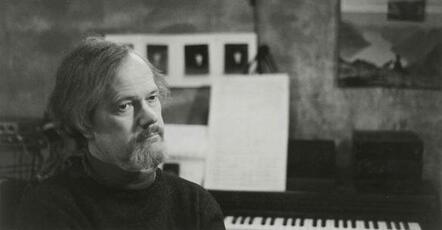New York, NY (Top40 Charts) Composer Ingram Marshall, about whose music composer Timo Andres once said that it "merges sacred and secular in mysterious ways, following a train of thought into territories entirely on its own," died on Tuesday at the age of 80.
"To reach the music of Ingram Marshall," New York magazine music critic Justin Davidson has said, "turn left at minimalism, right at electronica and keep going until just before you reach avant-garde. Marshall occupies a one-man lot on the contemporary music landscape. Or maybe it's more accurate to say that he creates his own musical landscapes—mists, mysterious places that afford moments of strange lucidity."
Though he was raised on the East Coast and was a resident of Hamden, Connecticut, Ingram Marshall spent much of his earlier creative life on the West Coast. He lived and worked in the San Francisco Bay area from 1973 to 1985, and in Washington State, where he taught at Evergreen
State College, until 1989. It was graduate study at the newly formed California
Institute of the Arts, where he received an M.F.A., that led him to California in 1970. He was a student of Indonesian gamelan music, the influence of which may be heard in the slowed-down sense of time and use of melodic repetition found in many of his pieces. In the mid-'70s, he developed a series of "live electronic" pieces such as Fragility Cycles, Gradual Requiem, and Alcatraz, in which he blended tape collages, extended vocal techniques, Indonesian flutes, and keyboards. He performed widely in the United States with these works. In late years, he concentrated on music combining tape and electronic processing with ensemble and soloists.
Marshall was Visiting Professor at the
Institute for Studies in American Music, Brooklyn College in 1990, and he has guest taught composition at The Yale School of Music, The Hartt School of Music, and the San Francisco Conservatory. His music has been performed by such ensembles and orchestras as Theatre of Voices, Kronos Quartet, Bang on a Can All-Stars, Los Angeles Philharmonic, San Francisco Symphony, St. Louis Symphony, and American Composers Orchestra. He has received awards from the
National Endowment for the Arts,
Rockefeller Foundation, Fromm Foundation, Guggenheim Foundation, and the American Academy of Arts and Letters.
Nonesuch released two albums of music by Ingram Marshall: Kingdom Come / Hymnodic
Delays / Fog Tropes II, performed by American Composers Orchestra, Theatre of Voices, and Kronos Quartet, respectively, in 2001, and Three Penitential Visions / Hidden Voices in 1990. Additionally, his famed 1981 piece Fog Tropes can be heard on the 1991 album American Elegies, on which John Adams conducts the Orchestra of St. Luke's.
























